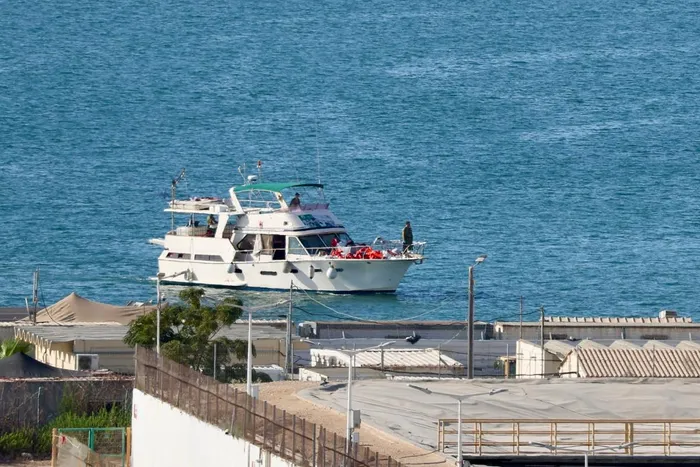
A boat from the Global Sumud Flotilla intercepted by Israeli forces in the Mediterranean sea off the Gaza Strip waters, arrives in the southern port of Ashdod .
Image: Saeed Qaq/ AFP
Israel has intercepted the Global Sumud Flotilla bound for Gaza on Wednesday night after its over 50 ships entered what they had called the high-risk zone.
The Israeli military reported that the state is preparing to “take control” of the flotilla with naval commandos and warships. It said it will not tow all 50 and will sink some at sea.
The Global Sumud Flotilla set sail from Spain on August 31 and is the largest maritime mission to Gaza to date, with more than 50 ships and delegations from at least 44 countries. The flotilla aims to challenge Israel’s naval blockade and deliver aid to Gaza.
But the interception begs the question: What laws is Israel breaking, and why is it illegal?
To answer this, we look at the difference between territorial and international waters.
Coastal countries control the waters closest to their shores, which are called territorial waters. They extend 12 nautical miles (approximately 22km) from the coast. In this zone, the country has full sovereignty, just like it has over its land.
They also have rights over up to 200 nautical miles (370 km) of ocean, including the water and seafloor. This area is called the Exclusive Economic Zone (EEZ). In the EEZ, countries can regulate activities such as fishing, mining, drilling, and other energy projects, while still allowing other countries freedom of navigation.
Okay, so what are international waters? International waters are the high seas that lie beyond any country’s territorial waters and EEZs. It is worth noting that they are not controlled by a single state, with their use governed by international agreements.
Just like on land, there are laws we have to abide by or face consequences; the sea has maritime laws that must be adhered to. The laws of the high seas are governed by the 1982 UN Convention on the Law of the Sea (UNCLOS). It stipulates that all states can enjoy freedom of movement of ships in the high seas and aircraft can fly freely.
Ships that are on the high seas are subject to the jurisdiction of the flag they fly.
The interceptions and attacks by Israel on the Sumud flotilla and previous flotillas took place mostly in international waters, where it has no territorial rights.
In this case, the Sumud Flotilla had been sailing through international waters and into Palestinian territorial waters, where it had the legal right to navigate and deliver humanitarian aid.
In 2024, during another flotilla, UN experts stated that: “The Freedom Flotilla has the right of free passage in international waters, and Israel must not interfere with its freedom of navigation, long recognised under international law.”
The Freedom Flotilla Coalition maintained that its mission is lawful and that it aims to deliver aid. In addition to that, it is protected by the following international legal instruments:
The United Nations Convention on the Law of the Sea (UNCLOS) – Guarantees freedom of navigation on the high seas
San Remo Manual on International Law Applicable to Armed Conflicts at Sea – Prohibits blockades that cause starvation or disproportionate suffering and forbids the targeting of neutral humanitarian missions
UN Security Council Resolutions 2720 and 2728 – These binding instruments demand unimpeded humanitarian access and the removal of all barriers to aid delivery
Convention on the Prevention and Punishment of the Crime of Genocide – Includes the prevention of acts deliberately endangering civilians
Fourth Geneva Convention – Imposes an obligation to permit the free passage of humanitarian aid and prohibit interference with relief operations and the targeting of civilian infrastructure
Rome Statute of the International Criminal Court – Criminalises the starvation of civilians as a method of warfare and willful obstruction of humanitarian aid.
Amnesty International has condemned the unlawful interception of the Global Sumud Flotilla. It said the move illustrates its determination to continue deliberately starving Palestinians in Gaza
Amnesty International’s Secretary General, Agnès Callamard, said: “By continuing to actively block vital aid to a population against whom Israel is committing genocide, including by inflicting famine, Israel is once again demonstrating its utter contempt for the legally binding orders of the International Court of Justice and its own obligations as the occupying power to ensure Palestinians in Gaza have access to sufficient food and lifesaving humanitarian assistance.
Amnesty International demanded that the crew of the intercepted vessels must be immediately and unconditionally released, calling their detention "unlawful".
Callamard further stated: “This interception is not just about blocking aid; it is a calculated act of intimidation intended to punish and silence critics of Israel’s genocide and its unlawful blockade on Gaza."
IOL